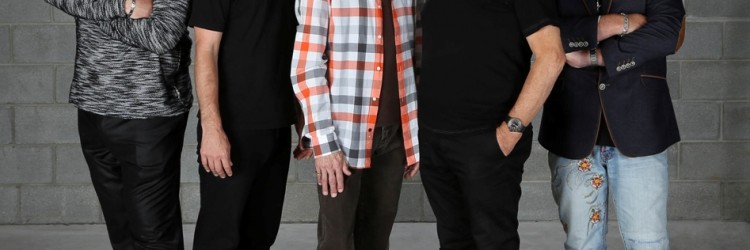Music | September 6th, 2017

Geoff Downes on the evolution of Yes
Since its inception in 1968 prog rock pioneers Yes have been breaking boundaries with complex soundscapes and experimental sounds, and their oeuvre has been constantly evolving. High Plains Reader had the opportunity to chat with Geoff Downes vocalist and keyboardist for Yes. Downes joined the band in 1980.
High Plains Reader: Is it true that you broke a Guinness World Record by playing 28 keyboards on stage?
Geoff Downes: I did that once in 1983 at a show from Japan. I don’t have as many now--I’m down to about 10 now. It’s a bit more manageable.
HPR: I read that for Yestival the band will be playing the songs of Yes chronologically?
GD: I think it’s a nice idea--something we’ve never done before is take a song off each album and put them in chronological order. It’s very interesting from a fan’s standpoint. I feel they can see how the music has developed over the years, so we try to do a fairly true rendition of each one. It’s just interesting to hear how a band has developed its sounds--especially in the formative years.
HPR: That’s a lot of ground to cover--How have you seen or rather heard Yes’s sound evolve?
GD: When I first showed up it was during the tenth album we’ll be playing. That was a bit of a turning point for Yes because they developed in the late 60s and through all of the 70s when all of the great monumental pieces that lasted 22 minutes long happened. Then all of a sudden--I think when Trevor Horn and I joined the proceedings it changed not only the pop dimension but the technological and experimental direction. I think we really helped Yes propel itself further into the 80s--after we did the Drama album.
It had a bunch of lyrics that were quite modern and urban rather than the ethereal and esoteric lyrics that Yes was known for. We became a much more hard hitting sound and I think that prepared Yes for another chapter in their history. I think that one thing Yes has continued to do is to revisit and to reinvent itself to become a whole new thing.
HPR: Technology has had a huge role in the advancement of the prog rock sound. How do you feel the advancements have affected your sound? Do you feel like it helped or hindered as of late?
GD: I feel it depends on the individual and how he works. The early Yes stuff was quite rudimentary in terms of its approach--which was a guitar, probably an organ, bass and drums. You could see over the years how Yes music started to move towards synthesizers and mellotrons and all of these instruments that kind of started to utilize new sounds. Not only was Yes known for its musicianship, it was also very well known for its high tech productions at the time.
HPR: Do you think the advent of punk rock had an effect on Yes?
GD: Not really. Punk rock was a revolt in many ways against bands like Yes. It was much more earthy and at times trashy kind of pop. It was very much a revolt against these great big, long pieces that prog rock was performing. I think at that point prog rock really kind of fell off the radar and I think that’s why Yes moved in the direction of a much more mainstream style at that time.
Certainly with the album Drama, and its follow up album 90125, which was Yes’s most successful album ever. Yes suddenly became more of a mainstream rock album.
HPR: With the amount of layered soundscapes and musical technicality--what was the writing process like for Yes?
GD: I don’t think was any kind of formula. It’s more ideas that forge a band that’s crafted in an orchestral fashion by the musicians with individual parts. It’s an intricate and rather complex way of working. In the early days the band would get to rehearsal and start experimenting with arrangements and treat it that way. It’s an interesting way of putting stuff together--relying on individuals.
IF YOU GO:
Yestival 2017: Yes with special guest Todd Rundgren
Monday, September 11, 7pm
801 50th Ave. S, Moorhead
March 2nd 2026
January 12th 2026
September 16th 2025
August 19th 2025
June 9th 2025
_(1)__293px-wide.jpg)



_(1)__293px-wide.png)
__293px-wide.png)